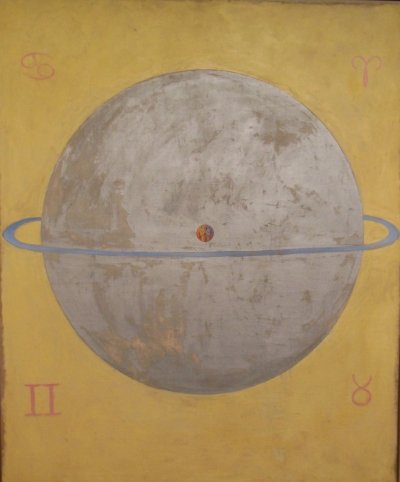For astrologers, open to incorporate the newly discovered planet Uranus into the astrological system, the name given seemed to be fortuitous. With Saturn the threshold of the known world had been reached, and Uranus, god of the sky, ouranos meaning sky in Ancient Greek, represented well all that was before and above. Uranus was given rulership over the Air-sign Aquarius, thought to fit that realm of the high and lofty so much better than Saturn who until that point ruled Aquarius, along with Capricorn.
Very little is known about the mythic Uranus, the divine genealogy does not give us any clues, and that makes it difficult to define what Uranus stands for. In contrast: for all the other gods and goddesses known as planetary rulers we have a wide range of archetypal expressions. Already their reference in casual conversation give us an idea: mercurial, venusian, martial, jovial, saturnian and lunar traits are well known and understood. But uranian?
Having exhausted the possibilities of myth astrologers adopted the bizarre method of correlating historical events that took place around the discovery of the planet with the nature of that planet. With Uranus being discovered in 1781, the Euro-centric view focussed on the French (and American) Revolution, and Uranus was from then on seen as an abrasive, rebellious, revolutionary force, flaring up in a sudden, disrupting the old order and heralding in the new. One has to ask: what about all the other events that happened at that time, and in other parts of the world? And what if the planet had been discovered in the Baroque period of conservative rule a hundred years before, or seventy years later, at the time when Neptune was discovered? Uranus, by that standard, would stand for something very different. This whole line of reasoning is highly questionable, at the very least. It’s only support lies in C.G.Jung’s notion of synchronicity, meaning that seemingly unconnected events may share a deeper relation than meets the eye.
So Uranus came to be known as a mainly disruptive force, and textbook after textbook was to repeat this line. The unpredictability and capriciousness symbolized by Uranus seemed to be too tempting as it added another layer of apprehension and danger to the chart. Saturn, ruler of Aquarius since Antiquity, did symbolize structure and stood for clear, rational and impersonal expression and now got supplanted by a god with an erratic behavior, striking unexpectedly.
Uranus, being part of the Inner Solar system, needs to be incorporated into the astrological system and clearly should represent Aquarius. He embodies everything Aquarius stands for but, admittedly, in a more idiosyncratic way than Saturn: open-mindedness, peer-to-peer relation, choosing one’s company free of traditional ties, non-hierarchical order, keen on one’s own individuality, free-thinking, disliking overly emotional bonds, defiant against hierarchical structure, needing open space and distance from others, and, last but not least, sudden, intuitive insights.
Also to keep in mind: Aquarius is a fixed sign: stubborn, demanding, and unflinching, thus persevering in its quest by steadfastness and not by forceful disruption and revolutionary ardor.
(revised Sep. 3rd, 2019)
Uranus and the Zodiac-Wheel, Greco-Roman mosaic C3rd A.D., Glyptothek Munich


